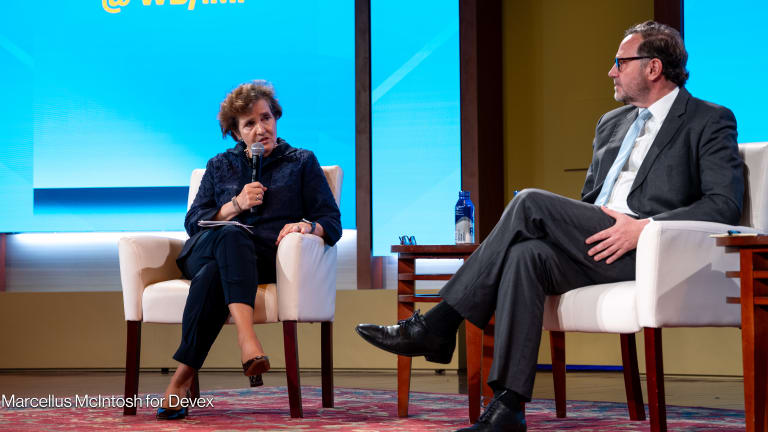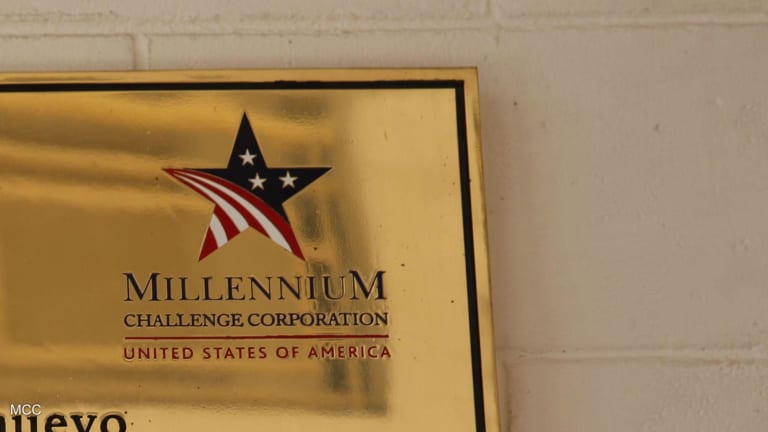Alice Albright navigates MCC growth and identity on its 20th birthday
The U.S. aid agency is ready for growth and new legislation could help, according to Albright, but some experts wonder if broader changes are needed.
This article is part of an occasional series Devex is producing this year to examine the Millennium Challenge Corporation as it marks its 20th year. On Jan. 23, 2004, the U.S. Congress created the Millennium Challenge Corporation, an aid agency that would help the lowest-income countries clinch large grants if they could turn their economic and social policies around and show good governance. But today, on its 20th anniversary, it is unclear if it’s set for a new period of growth or faces an identity crisis. For Alice Albright, MCC´s chief executive officer, there’s no doubt. It is past the “startup stage” and ready to expand to additional countries and adapt to global trends over the next several decades. But it’s also running out of places to work and is grappling with how its model can stay relevant within its constraints and actually support countries, or whether it must make significant changes, some development experts have said. Unlike the sprawling U.S. Agency for International Development, MCC has often had a lower profile, but Albright wants more people to know about the work it has done since its birth 20 years ago. “It’s not easy to go from a startup to something that’s more mature,” she told Devex, but “MCC is now, as I like to say, a thing.” MCC started as an experiment to deliver aid in a distinctly different way. The agency only works with low- and lower-middle-income countries that meet a set of specific economic, social, and governance criteria. Countries chosen for a compact — or large grant agreement often worth hundreds of millions of dollars — identify key constraints to economic growth and co-design with MCC a plan to address the challenges. The projects are carried out by locally led organizations set up as part of the process. Over the years MCC has signed 46 compacts, or grant agreements, with 31 countries to the tune of about $17 billion. The programs are expected to benefit more than 323 million people, according to the agency. Some 65% of the grants have been in Africa, with transportation, agriculture, and energy as the most common sectors of focus. MCC has also completed dozens of “threshold programs” to help countries address policy challenges and pave the way for a compact. When he proposed MCC back in 2002, former U.S. President George W. Bush envisioned that it would eventually have an annual budget of about $5 billion, far more than MCC ever has received. Its budget hovers at around $900 million annually. Still, Albright, who has been with the agency since February 2022, said MCC has done well with the funding it has had and achieved a significant impact. “We can always use more money,” she told Devex, adding that she will always advocate for lawmakers to provide more funding, but can’t comment on the “budget ins and outs about why MCC has not gotten more money.” With more cash, MCC could not only offer bigger grants, but expand some of its newer tools, including regional compacts, and help countries that previously received MCC money but backslid in their governance or economic policies and need to get back on track. The agency and lawmakers must “think about how we can use the tools that have been so well developed not only to address the problems of tomorrow, but also figure out what countries we could also work in to continue to have the same kind of positive effect,” Albright said. To that end, Albright is pushing Congress to pass the Millennium Challenge Corporation Candidate Country Reform Act, which would allow MCC to expand the pool of countries it can potentially work with to include more middle-income economies. The Senate Foreign Relations Committee approved the bill last year, but its fate remains in limbo in a tricky political environment, where passing legislation has proven nearly impossible. MCC has traditionally had bipartisan support in Congress and Albright said lawmakers have agreed on the substance to add about 30 additional countries to its candidate pool but the challenge is finding a way to get the bill approved. “The rationale for that is if you look at where poverty exists, it exists in more countries than just the 81 that we work in that constitute the low-income and lower-middle-income countries as defined by the World Bank,” she said. There are a lot of economic disparities in many of those countries and opportunities for investment, she said. Not all development experts have supported the expansion of the country pool. Some suggest the agency could make other reforms that would allow it to keep its focus on the lowest-income countries. Albright hopes the year ahead will bring expansion for the agency, which must continue to adapt to changing needs and conditions as it looks ahead to its next 20 years. That likely includes adjusting how it addresses climate change and the types of projects it tackles, including challenges to technology access, she said. “Our toolkit is durable,” she said. “How the founders have set up the place and how it’s evolved, we’ll have a great ability to keep what’s critical but continue to adapt.”
This article is part of an occasional series Devex is producing this year to examine the Millennium Challenge Corporation as it marks its 20th year.
On Jan. 23, 2004, the U.S. Congress created the Millennium Challenge Corporation, an aid agency that would help the lowest-income countries clinch large grants if they could turn their economic and social policies around and show good governance. But today, on its 20th anniversary, it is unclear if it’s set for a new period of growth or faces an identity crisis.
For Alice Albright, MCC´s chief executive officer, there’s no doubt. It is past the “startup stage” and ready to expand to additional countries and adapt to global trends over the next several decades. But it’s also running out of places to work and is grappling with how its model can stay relevant within its constraints and actually support countries, or whether it must make significant changes, some development experts have said.
This story is forDevex Promembers
Unlock this story now with a 15-day free trial of Devex Pro.
With a Devex Pro subscription you'll get access to deeper analysis and exclusive insights from our reporters and analysts.
Start my free trialRequest a group subscription Printing articles to share with others is a breach of our terms and conditions and copyright policy. Please use the sharing options on the left side of the article. Devex Pro members may share up to 10 articles per month using the Pro share tool ( ).
Adva Saldinger is a Senior Reporter at Devex where she covers development finance, as well as U.S. foreign aid policy. Adva explores the role the private sector and private capital play in development and authors the weekly Devex Invested newsletter bringing the latest news on the role of business and finance in addressing global challenges. A journalist with more than 10 years of experience, she has worked at several newspapers in the U.S. and lived in both Ghana and South Africa.








